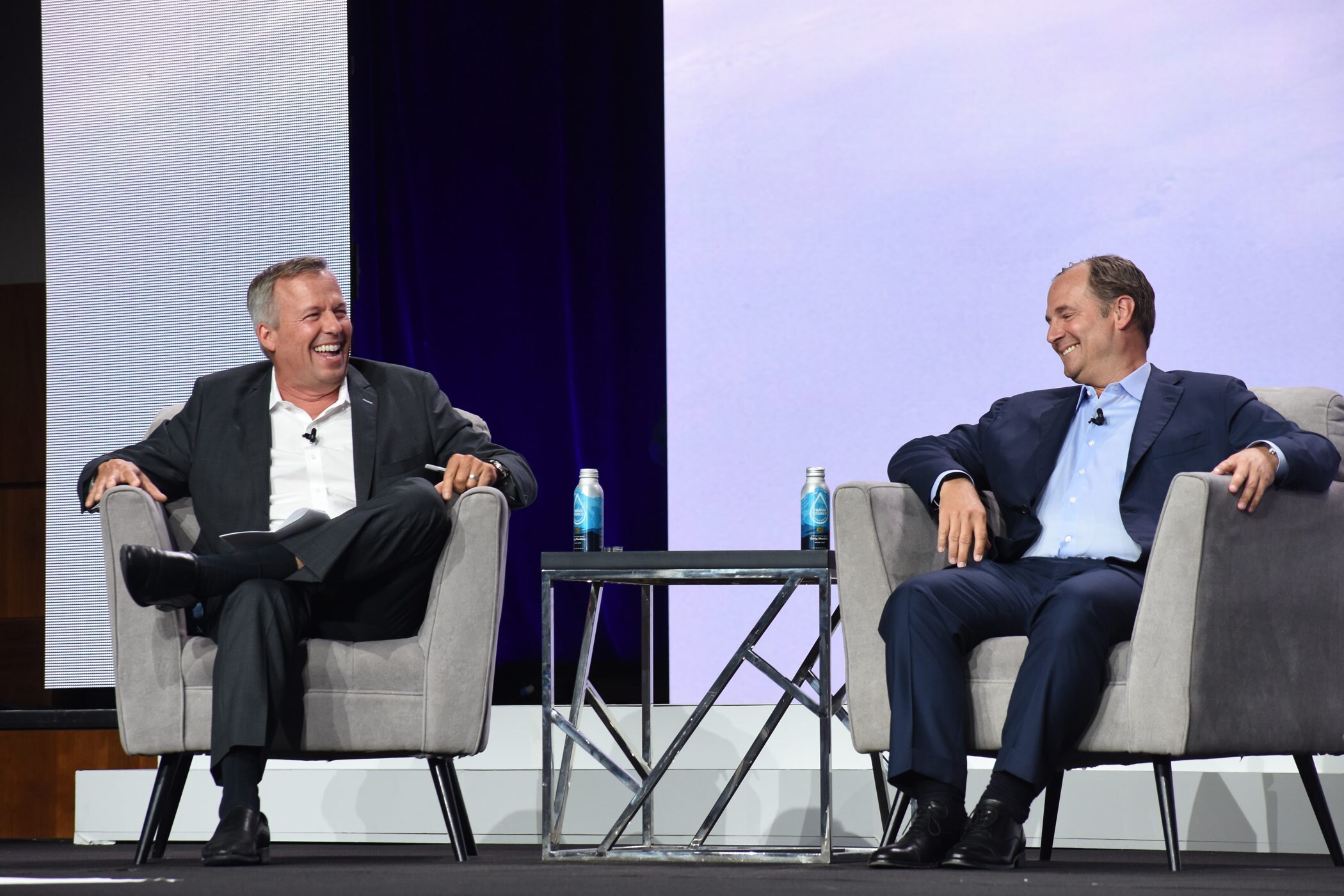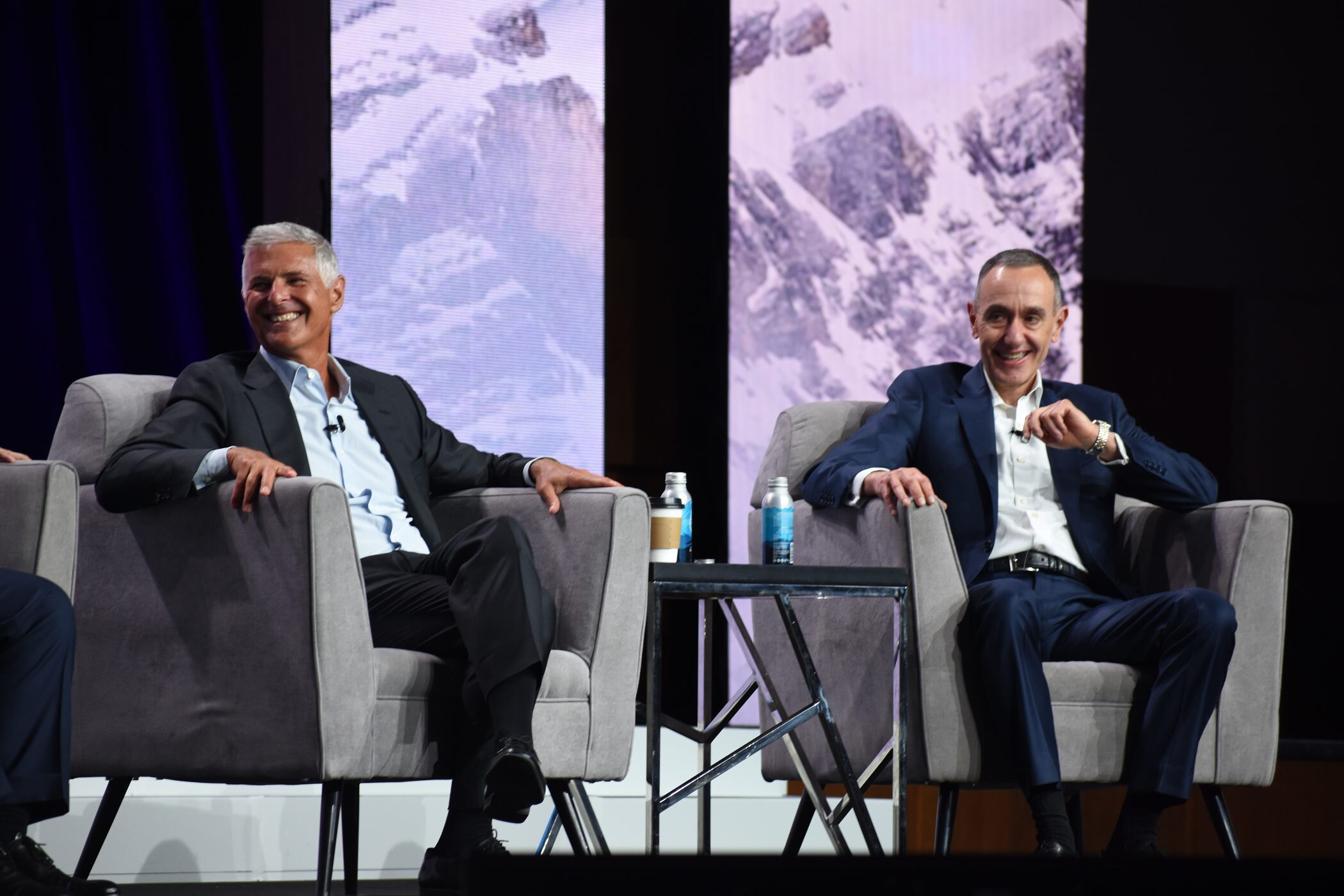LAS VEGAS — As hotel brand companies look to grow their global footprints, their chief executives are looking for franchise partners and operators in international markets.
At the Aimbridge Summit Live! 2023 conference, the CEOs of Marriott International, Hilton and IHG Hotels & Resorts reinforced that franchising is an integral part of growth. The discussion, moderated by Aimbridge Hospitality President and CEO Mike Deitemeyer, focused on the role of third-party operators, leadership skills and where technology can enhance guest experiences.
Marriott has roughly 1.5 million rooms globally, and about 60% of the portfolio is franchised, President and CEO Tony Capuano said. Five years ago, that was 55%, a sign the trend line is moving meaningfully toward a higher percentage of franchised business.
Marriott is thoughtful and deliberate about choosing its operators, he said. It looks at cultural compatibility, how companies treat their associates, how they take care of their guests and their stewardship of the physical properties. It also considers whether they put themselves in the shoes of their ownership groups.

The profile of the owner community continues to shift and evolve, he said. When Marriott chooses a third-party operator, that’s not necessarily a strike against franchise management. There are owner/operators who don’t want to encumber a property with a long-term management agreement as well as those who just prefer the third-party model.
“All the brands and companies with the right partners have fully embraced the franchise model,” he said. “As long as we're picking the right partners, it's a critical part of our growth strategy going forward.”
Hilton’s portfolio is 75% franchised globally and 90% franchised in the U.S., President and CEO Chris Nassetta said. When he started with Hilton 16 years ago, the company didn’t have any franchised hotels in the Europe, the Middle East and Africa or the Asia-Pacific regions. Now, half of its EMEA hotels are franchised, and one third of its APAC hotels are as well.
Franchising is growing globally in part because management companies are as well, Nassetta said.
"You taking the show on the road is affording an opportunity for us to work with great partners like you,” he said.
The bulk of Hilton’s growth around the world will come from franchising, he said. That means it's always looking for operating partners who have matching values and believe in the impact they can have on local communities.
The U.S. has a deep pool of qualified third-party operators. In international markets, however, the pond is much shallower, Capuano said.
IHG Hotels & Resorts CEO Elie Maalouf said one of the company’s barriers to international growth is finding great local operators. Trying to open hotels in other countries, even those with large populations, can be difficult if there isn’t an industry and community of local third-party operators. That creates opportunities for others to move in and develop one.
Leadership Skills
Any form of leadership is about two things: culture and strategy, Nassetta said.
“What I’m always looking for, whether it’s leadership in corporate or leadership on property, is somebody who can build the right kind of culture that can get people in the property motivated, inspired,” he said.
That can help employees take on difficult tasks, feel they’re part of something bigger than themselves and feel pride in what they do, he said.
Leaders need to not only have a strategy but know how to break it apart and communicate to people to put it in motion, Nassetta said.
Maalouf said companies can’t grow globally just by taking people from the U.S. or the United Kingdom and moving them to international markets.
“You really have to develop and grow local talent,” he said.
In many different parts of the world, people aspire to careers in hospitality, he said. By extension, the brand companies are looked up to as good places to work.
“It’s an opportunity to find that local talent, develop that local talent and bring them into your global platforms,” he said.
Capuano said he’s learned several lessons from his conversations with Marriott Chairman Emeritus Bill Marriott Jr. The first thing is that the details matter.
“The little details will make a difference,” he said. “They make a difference between a great stay and a mediocre or a terrible stay. They make the difference between a highly profitable hotel and a marginal hotel. They make a difference between identifying, developing and retaining an extraordinary leader and losing that leader to one of the other great companies in the industry.”
The advice Marriott gives to young leaders is to be humble, Capuano said. He also advised that after the difficult times everyone faced during the pandemic, it’s important to remember hospitality is a fun business.
“If we conduct ourselves right and work the way we should work, we get ourselves woven into the fabric of people’s lives,” he said. “We’re there for the most important moments of their lives — celebrations, important milestones in their careers — and we have an opportunity to have a positive influence on those important moments.”
Using Technology
Even as technology’s role in hospitality grows, the core tenet of people serving people will remain the same, Nassetta said. Technology use for digital check-in, room selection and in-room audio/visuals controlled by a phone can help reduce friction. But the more powerful tech transformations will come from investing in systems that allow associates to better serve guests.
Tech applications through the property management systems, workflows and messaging can enable in-the-moment responses to guest needs and resolve problems, which could revolutionize the business and create more reliable, consistent and friendly stays, he said.

That resolution has to be more than just awarding loyalty program points, he said. The technology built into the workflows should help associates solve problems right then.
The technology will bring efficiencies that will allow associates to focus on “the things that really add value to the experience for customers, not focus on the things that are more mechanical,” he said.
Marriott recently hosted 30 graduate students from MIT at its new headquarters. They were interested in artificial intelligence and asked Capuano whether he was excited about the possibility of running a hotel without employees.
“My goodness, I hope not, right?” he said.
Technology's greatest value, he said, is the time it can free up for associates to learn more about the guest checking in.
“As a result of that incremental capacity, it’ll enhance their experience and enhance their stay and will go a long way to improving the performance of our hotels and our companies and our industry.”
Editor’s note: Chris Nassetta serves on the board of directors for Hotel News Now’s parent company, CoStar Group.
